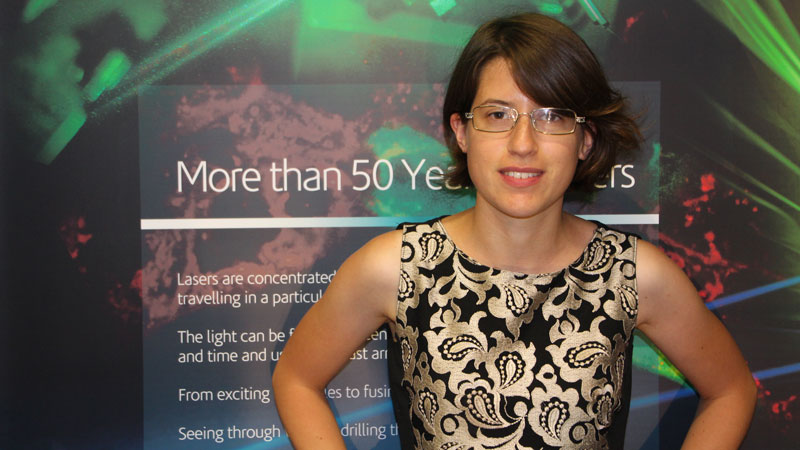Published:

A Heriot-Watt postgraduate student has been awarded a historic fellowship after being identified as one of the UK's most gifted young research scientists.
Mariastefania De Vido is just one of 12 recipients of the prestigious Industrial Fellowship from the Royal Commission for the Exhibition of 1851.
The laser scientist, who is in her 3rd year of an Engineering Doctorate at the Centre for Doctoral in Applied Photonics based at Heriot-Watt University, was selected for her groundbreaking work in developing a new type of high-energy laser that is far more efficient than current standards.
My research at Heriot-Watt and at the Rutherford Appleton Laboratory has allowed me to grow as a scientist and to make a real contribution to the wonderful field of high energy lasers.
The pioneering technology could hold tremendous benefits to a variety of industries. Applications include high throughput processing of industrial materials, such as enhancement of metal materials for the avionic sector, and the production of bright particle and X-ray beams, which could pave the way to novel medical diagnosis and treatment techniques.
Mariastefania, who moved to the UK five years ago from her home in Italy and who is carrying out her research at the STFC Rutherford Appleton Laboratory in Oxfordshire, said: “It is a tremendous honour to be selected for an Industrial Fellowship.
“Encouraging the next generation of scientists is absolutely crucial to advancing society as a whole. My research at Heriot-Watt and at the Rutherford Appleton Laboratory has allowed me to grow as a scientist and to make a real contribution to the wonderful field of high energy lasers. I am really happy that the Royal Commission has recognised the potential of my project. I am looking forward to make the most of the grant and of the networking opportunities which come with being part of the Royal Commission family”.
The Industrial Fellowships provide graduates with up to £80,000 each to complete their doctoral studies, enabling them to develop innovative technologies with commercial potential in collaboration with an industrial partner and academic institution. The projects, funded for up to three-years, will ideally lead to a patent or substantial business development, allowing the young researchers to conduct impactful research while gaining valuable industrial experience.
Bernard Taylor, Chairman of the Royal Commission for the Exhibition of 1851, said: “It is critical that the young scientists and engineers that form the future innovation landscape of Britain are supported in their efforts. Our Industrial Fellowships provide funding to the most promising technologies that will enrich British industry, and allow the research to be directed towards commercialisation from the start of its development. We are proud to have awarded twelve impressive innovators with Fellowships this year. Their projects span a wide range of fields, including cancer therapies, autonomous boats and cars, aerospace engineering, and laser power, demonstrating the broad diversity of talent within the science and engineering resources of this country”.
Applications for the 2019 Industrial Fellowships will open on the 1st October 2018. To learn more visit the website here.